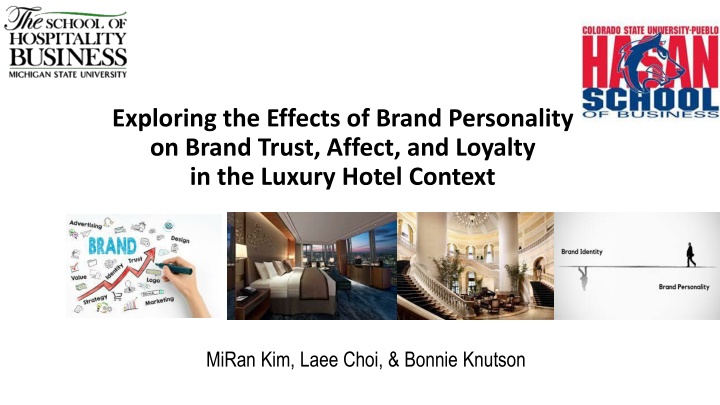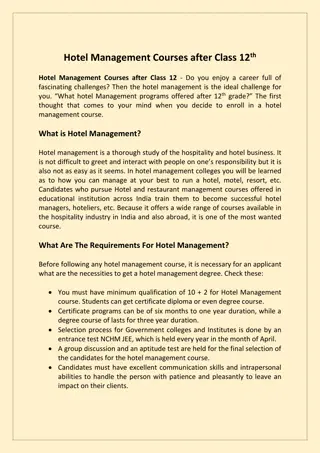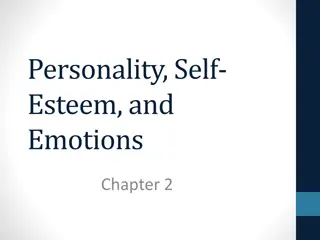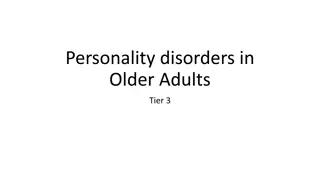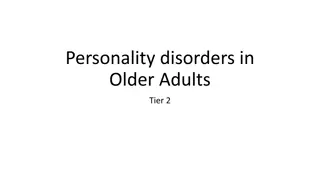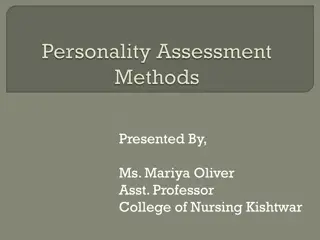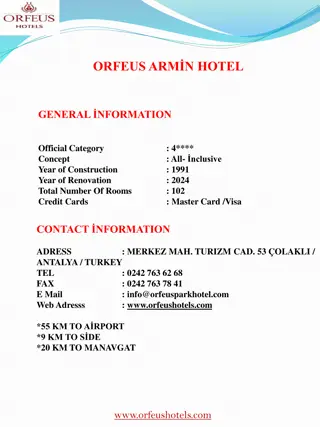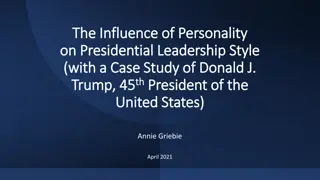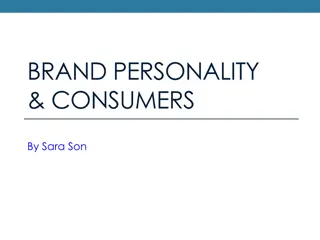Impact of Brand Personality on Luxury Hotel Trust, Affect, and Loyalty
This study delves into the effects of brand personality on brand trust, affect, and loyalty in the luxury hotel industry. It explores dimensions such as sincerity, excitement, competence, and sophistication, shedding light on consumer behaviors in this dynamic market. With a focus on the top luxury hotel companies and the global market landscape, the research aims to provide valuable insights for hospitality marketers and practitioners.
Download Presentation

Please find below an Image/Link to download the presentation.
The content on the website is provided AS IS for your information and personal use only. It may not be sold, licensed, or shared on other websites without obtaining consent from the author.If you encounter any issues during the download, it is possible that the publisher has removed the file from their server.
You are allowed to download the files provided on this website for personal or commercial use, subject to the condition that they are used lawfully. All files are the property of their respective owners.
The content on the website is provided AS IS for your information and personal use only. It may not be sold, licensed, or shared on other websites without obtaining consent from the author.
E N D
Presentation Transcript
Exploring the Effects of Brand Personality on Brand Trust, Affect, and Loyalty in the Luxury Hotel Context MiRan Kim, Laee Choi, & Bonnie Knutson
The Global Luxury Hotel Market The emergence of a new market segment (Chadha and Husband, 2006) Valued at USD 83.10 billion in 2017 and is anticipated to increase to 222 billion in 2024 (Luxury Hotel Market, 2018; Reuters, 2019). Globalization and cultural convergence (Chadha and Husband, 2006) A consistent rise in the number of wealthy consumers (Okonkwo, 2009)
Top Five Global Luxury Hotel Companies The top five companies (Marriott Hilton, Hyatt Hotels, Four Seasons, and Shangri-La ) make up more than 25% market share of the luxury hotels segment.
Brand Personality Brand Personality is the set of human characteristics associated with a brand (Aaker, 1997). Customers are more likely to choose a specific brand that they like and that is consistent with their personalities (Health and Scott, 1998). Brand personality relates to consumer trust and emotions (Kim and Kim, 2004) and strong and differentiated brands are intangible assets that enhance a firm s financial value and brand equity (O Neill & Mattila, 2006).
Luxury Hotel Brand Personality Customers feel better about themselves by purchasing luxury brands as they feel a sense of pride, accomplishment, and fulfillment in owning products and services of luxury brands (Keller, 2009). In the luxury hotel market, brand personality can be a critical driver to develop strong relationships with customers and loyalty with one brand over another (Siguaw et al., 1999). As an important emerging market, the study of brand-personality functions in this luxury hotel segment will be timely for hotel marketers.
Study Objectives Study Objectives Based on Aaker s (1997) Brand Personality Dimensions, this study is to: Examine the impact of brand personality dimensions-sincerity, excitement, competence, and sophistication-on brand trust, affect, and loyalty in the luxury hotel context. Explore the relative impact of each brand personality dimension on brand trust and affect through dominance analysis. Considering that little research has been conducted on the role of brand personality on actual consumer behaviors in the hospitality industry, this study can contribute significant insights into the hospitality literature and practices.
The Proposed Model The Proposed Model Brand Personality H1 Sincerity Brand Trust H9 H2 H3 Brand Loyalty Excitement H4 H5 H10 Competence Brand Affect H6 H7 H8 Sophistication
Methodology Methodology A pilot study (n=30) A self-administered on-line survey using Qualtrics Luxury hotel guests in the U.S. Conducted the survey December 2018 A five-point Likert scale (1=not at all to 5: exactly, 1=strongly disagree to 5=strongly agree) Used SPSS 22.0 software for descriptive statistics and multiple regression. Conducted dominance analysis
Respondents Profiles Respondents Profiles Gender Average age Female (80%) vs. Male (20 %) 19-29 years old: 50% 50-59 years old:46% 40-49 years old:4% Caucasians: 96% Others (e.g., : African American, Hispanic): 4% Four-year degree: 64% Post graduate degree:24% Others (e.g., college, Associate s degree, no degree): 12% Prefer not to respond: 40% $100,000-$199,000: 20% $500,000 or more: 16% $300,000-$399,000: 12% $200,000-$299,000: 8% Ethnicity Education Income
Model Testing Model Testing Brand Personality .498* Sincerity Brand Trust .579*** .679*** R =.670 .520* Brand Loyalty Excitement .727*** R =.556 .909*** .554*** Competence Brand Affect .951*** R =.649 .540* .535** Sophistication
Dominance Analysis: Dominance Analysis: Relative importance of brand personality dimensions on brand trust and affect
Dominance Analysis: Dominance Analysis: Relative importance of brand personality dimensions on trust and affect
Implications & Discussion The findings of this study can make valuable contributions to brand personality literature and brand managers who may apply the findings to develop more competitive brand strategies and create better brand value In particular, this study provides a deeper understanding of the customer- brand relationship in the hospitality business context.
Implications & Future Study Further, the brand personality dimensions developed by Aaker (1997) (i.e., sincerity, excitement, competence, and sophistication) were shown to be a reliable and valid framework in our study. To provide a deeper and more precise understanding of brand personality, future research can add new dimensions of brand personality (e.g., exclusiveness, innovativeness) and other constructs (e.g., perceived value) in the proposed research model.
